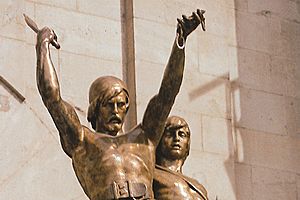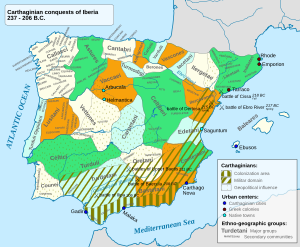Indibilis and Mandonius facts for kids
Indibilis and Mandonius were two important leaders, known as chieftains, of an ancient group of people called the Ilergetes. The Ilergetes lived in the Iberian Peninsula (which is modern-day Spain and Portugal) a very long time ago, around the 3rd century BC. Historians like Polybius and Livy wrote about them, saying they were among the most powerful Iberian leaders of their time. While Livy called one brother Indibilis, Polybius sometimes called him "Andobales," but they both agreed his brother was Mandonius.
Contents
Early Battles and Roman Captivity
Indibilis first fought against the Romans in 218 BC. He sided with the Carthaginians in a battle called the Battle of Cissa. The Roman general Gnaeus Cornelius Scipio Calvus defeated them. Indibilis was captured along with the Carthaginian general Hanno.
In 217 BC, Indibilis became free again. He and his younger brother Mandonius decided to cause trouble for other Iberian tribes. These tribes were friendly with the Romans. Scipio Calvus stopped them by fighting back, killing some of their people, taking others prisoner, and taking away their weapons.
When the Carthaginian general Hasdrubal Barca heard about this, he came to help his Iberian allies. At this time, the Romans got important information from the Celtiberians. The Celtiberians joined forces with Scipio Calvus to attack New Carthage. On their way, they captured three towns and won two battles against Hasdrubal, Indibilis, and Mandonius. The Roman and Celtiberian armies killed 15,000 enemy soldiers and captured 4,000.
Return to Power and Shifting Sides
After these defeats, Indibilis and Mandonius stayed out of the fighting until 211 BC. Then, they gathered 7,500 soldiers from another tribe called the Suessetani. They joined forces with Hasdrubal again.
Publius Cornelius Scipio, who was the father of the famous general Scipio Africanus, decided to attack the brothers. He didn't want to be trapped by the Carthaginians. He marched at night and fought them at dawn. Sadly, Cornelius Scipio was killed during this battle, which was part of the Battle of the Upper Baetis. His brother, Scipio Calvus, was killed a few days later in another part of the same battle.
Even though Indibilis and Mandonius usually supported the Carthaginians, they soon changed their minds. The Carthaginian general Hasdrubal Gisco started demanding money from them. He also took Mandonius's wife and Indibilis's daughters as hostages. He kept them in New Carthage to make sure the brothers stayed loyal.
Alliance with Scipio Africanus
In 209 BC, Scipio Africanus captured New Carthage. He treated the hostages with great respect and returned them to their families. This act impressed the Iberian people very much.
Because of this, Indibilis and Mandonius decided to leave the Carthaginians and join the Romans. In 209 BC, they made a peace treaty with the Romans, and many other Iberian tribes joined this alliance too. They then worked with the Romans in a campaign against Hasdrubal Gisco. This led to a big victory at the Battle of Baecula in 208 BC.
Final Rebellion and Fate
As long as Scipio Africanus was in Spain, Indibilis and Mandonius remained friendly with the Romans. However, in 206 BC, a rumor spread that Africanus was very sick or even dead. This rumor caused a rebellion among some Roman soldiers and also made Indibilis and Mandonius start another revolt. They wanted the Romans to leave Iberia.
Africanus recovered from his illness and quickly put down the Roman soldier rebellion. Then, he fought against the armies of Indibilis and Mandonius and defeated them. The brothers surrendered to Africanus and asked for mercy. Scipio Africanus released them on good terms.
The next year, Africanus left Spain to prepare for an attack on Carthage. Indibilis and Mandonius were only afraid of Africanus. So, with him gone, they decided to rebel one last time. They gathered a large army of 30,000 foot soldiers and 4,000 cavalry. In a battle with the Romans, most of their army was destroyed. Indibilis was killed during the fight. Mandonius escaped with the few remaining soldiers. As part of the peace agreement, his own tribesmen handed him over to the Romans. What happened to Mandonius after that is not known.
Images for kids
See also
 In Spanish: Revuelta de Indíbil y Mandonio para niños
In Spanish: Revuelta de Indíbil y Mandonio para niños
 | Aaron Henry |
 | T. R. M. Howard |
 | Jesse Jackson |




